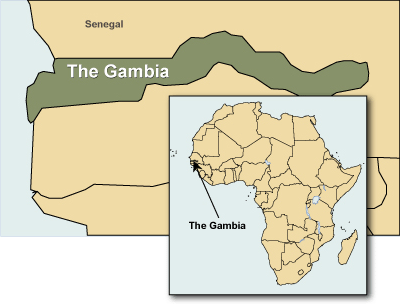The Gambia

The Gambia is the smallest of the mainland African countries and one of the poorest nations in the world. Vector-borne diseases such as malaria and dengue are endemic here, as are water-borne diseases such as Hepatitis A and typhoid fever. Acute respiratory infections, including pneumonia; diarrheal diseases; and parasitic worm infections are also major causes of death in adults and children.
NIAID-Funded Activities
The largest NIAID investment in The Gambia focuses on malaria, particularly studies of severe malaria in children and the evaluation of microbial larvicides as a potential method of mosquito control. NIAID also funds projects on HIV/AIDS and Helicobacter pylori, a bacterium that infects the stomach and can lead to ulcers and cancer.
Scientific Advances
Pneumococcal Vaccine Trial Reduces Infant Mortality in The Gambia
The World Health Organization estimates that over 1.6 million people—including more than 800,000 children under five—die every year from pneumococcal infections. The Gambia Pneumococcal Vaccine Trial was the first major randomized, controlled vaccine clinical trial in nearly 20 years to show a statistically significant reduction in overall child mortality. Findings indicate that vaccinating infants against the bacterium Streptococcus pneumoniae could substantially reduce death and illness among children in developing countries, including in rural areas with limited access to public health systems.
Learn more about the Gambia Pneumococcal Vaccine Trial.
Sequenced Mosquito Genome May Lead to New Methods of Preventing Spread of Dengue and Yellow Fever
Researchers supported by NIAID have produced a draft genome sequence of Aedes aegypti, the mosquito species commonly associated with the transmission of dengue, yellow fever, and chikungunya. These viral diseases have recently reemerged in endemic areas as efforts to control Ae. aegypti populations are being challenged by growing resistance to insecticides.
The researchers hope that studies of the new genome sequence, which is five times larger than that of the malaria-transmitting Anopheles gambiae mosquito, will not only enhance research on Ae. Aegypti, but also lead to new ways of genetically altering the species so it cannot acquire or spread disease.
Learn more about the Ae. Aegypti genome.
Related Links
Government
Non-government
back to top